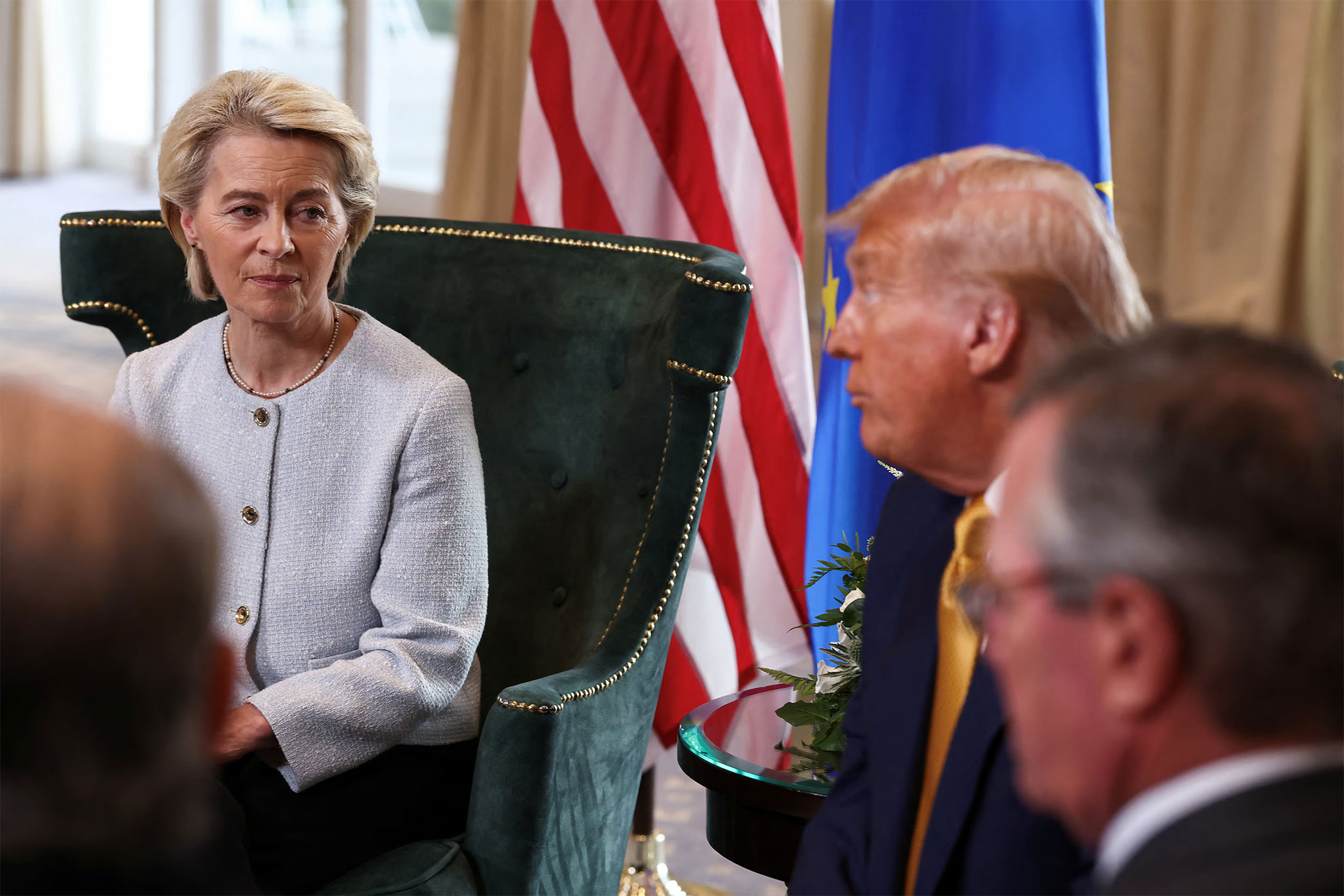Asymmetric Dependence, the New Economic Order
This editorial by Alonso Romero originally appeared in the August 4, 2025 edition of La Jornada, Mexico’s premier left wing daily newspaper. The views expressed in this article are the author’s own and do not necessarily reflect those of the Mexico Solidarity Project.
The image of Ursula von der Leyen, President of the European Commission, in Trump’s office when the deal between the European Union (EU) and the United States (US) was announced will undoubtedly go down in history. The century of European humiliation begins with that moment. What the EU has given up is staggering: €600 billion in investments, a commitment to purchase €750 billion in energy from the US over the next three years, full access to US agricultural products, and, in addition, EU goods will be subject to a widespread 15 percent tariff. We saw something similar with Japan, where investment commitments of $500 billion in infrastructure projects were announced, with a guarantee from the Japanese government, where the profits will be 90 percent for the US, full access to US agricultural products, and in return, Japan will have a widespread 15 percent tariff. Korea accepted a similar deal to Japan, for around $300 billion. All three included large sums of money for weapons purchased from US companies. Why are countries accepting this, and what consequences will it have for them? The key is what is known in geopolitics as asymmetric dependence.
The EU, Japan, and Korea have trade surpluses with the US in various sectors, including some high-tech sectors. They are “advanced” economies, and according to the economics textbook, this should allow them to have a much stronger negotiating position. The reality is that all three are extremely weak and vulnerable in essential sectors, especially one: energy. The EU imports nearly 60 percent of all its energy, Japan 97 percent, and Korea 98 percent, according to the US Energy Information Administration. Since 2017, the US has been a net energy exporter and, since 2025, has an open policy of energy dominance, and the energy sector is precisely the clearest form of asymmetric dependence. If we think in strictly economic terms, if two countries exchange goods and services, the only thing we should be concerned about is the value of those goods and services, and that would be more of a statistical statistic than anything else. The reality is that there are sectors that are much more strategic than others and whose importance goes beyond monetary value. Whoever controls access to these assets has geopolitical power over others, and the more dependent one is, the greater the disadvantage one faces.
Trump understands this well and uses energy as a weapon, not only to extract concessions on tariff deals, but also to ensure that sectors they consider strategic end up in the US. An example of this in Europe is ASML, the most advanced semiconductor lithography equipment factory on the planet. Trump and Biden have offered a lot to gradually relocate to the US; they have not succeeded. Probably part of the $600 billion in EU investments in the US will be required to be in that sector.
None of this would be possible if energy did not provide a weapon of asymmetric dependence, which can be used to completely paralyze an economy. Of course, this position did not happen overnight. Europe has been putting its own neck in a noose for at least 40 years by adopting measures that go against all logic: privatization of state-owned energy companies, closure of local production fields in the North Sea and Gronigen, the installation and massive migration to electrical systems dominated by intermittent power, shutting down nuclear reactors. The sale of strategic assets has left EU countries at a total disadvantage, with no way to react other than “what the market tells them.” The EU knows this, and in September 2024, Mario Draghi issued the report The Future of European Competitiveness, in which he warned of the danger of dependence in sectors such as food and energy, and called for centralized EU planning to coordinate efforts and increase local production, energy, technological, and food sovereignty for the continent. The market, he said, wouldn’t solve anything; believing in it was a serious risk to the region’s productivity and economic security. Now we see that they’ll do the opposite, even allowing the full entry of US agricultural products—a brutal mistake, given that, contrary to the “free market” narrative, it’s historically the sector most subsidized and supported by the US government.
Without a doubt, we’re now thinking: how is Mexico doing? Mexico ceased to be energy sovereign in 2014, thanks to terrible neoliberal policies. It now imports 21 percent of its total energy consumption, especially natural gas and refined products like gasoline and diesel, mainly from the US. But Mexico has something that other countries don’t, in addition to local production accounting for almost 80 percent of its consumption, and that is state-owned enterprises that allow for flexibility in responding to potential crises. We saw this in 2021, when a winter storm halted the supply of natural gas to Mexico. While private companies stopped generating electricity, the state-owned company quickly switched the fuel used by the plants, allowing service to be restored. This flexibility is unthinkable without state-owned enterprises. That is why strengthening them is and has been a central part of the nation’s project. Their importance goes beyond just the value of their goods and services: they are a vital mechanism in this new world governed by the rules of asymmetric dependence.
-
Not By Bread Alone…
Returning to the Mesoamerican milpa agricutlural system could revitalize agriculture, while defending Mexicans and Mexico from a tangled, global necro-politics.
-
Socialism & Anti-imperialism in Mexico During the 1970s & 1980s
Widespread anti-imperialist mobilizations served as a pressure mechanism against the subservient and collaborationist policies of regional governments.
-
Iranian Ambassador Asks Mexico to Condemn US & Israeli’s Illegal Attacks
The Ambassador confirmed 106 young children were confirmed murdered after the US & Israel regimes bombed a girl’s school.




